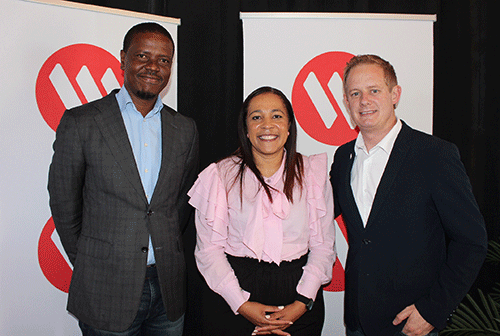Bank Windhoek’s executive officer of retail banking services and specialist finance James Chapman said the BRICS alliance nations have shown remarkable resilience in facing challenges, adapting and prospering in an ever-changing world.
Similarly, he said, Bank Windhoek has weathered several economic storms in its more than 40-year history as the only 100% Namibian-owned Bank.
“We have almost seen the perfect storm in recent years – stagflation, a liquidity crunch, severe droughts and a global pandemic – we do, however, believe we have emerged more robust each time,” he said, highlighting the bedrock of the Bank’s resilience, is its customer’s trust and loyalty, which it highly values.
Chapman spoke at a stakeholder engagement breakfast for key customers in Windhoek on Friday, 20 October 2023.
The event’s objective brought together the Bank’s valued customers to discuss a topic of great significance in today’s global economic landscape: BRICS, an acronym for Brazil, Russia, India, China, and South Africa.
“The heart of the BRICS partnership lies in resilience and collaboration,” he said.
Chapman added that building relationships makes the Bank tick – and that through stakeholder engagements, such as these, it is Bank Windhoek’s ambition to reinforce being Connectors of Positive Change, to collaborate and partner with customers to understand and add value to their business.
“We take this role seriously and continuously invest in our people, the organisation and the communities we operate because we are an integral part of Namibia and its economic landscape,” he alluded.
Hosted by Bank Windhoek, the event’s speakers included Salomo Hei, an experienced managing director of a research outfit named High Economic Intelligence, with a demonstrated history of working in the research industry with a strong focus on economics and investments.
Hei is currently the Namibia Statistics Agency chairperson.
With a wealth of experience in economics and investments, Hei spoke more about the BRICS countries and what it could mean for businesses in Namibia.
Hei provided an overview of the BRICS history and compared it to the G7, the Namibian economy regarding exploration opportunities, since Namibia has a vast area of commodities that it can offer to BRICS.
“The term was initially created as BRIC, without South Africa, by Goldman Sachs economist Jim O’Neill in 2001. He believed that by 2050, the four BRIC economies would dominate the global economy. In 2010, South Africa joined,” said Hei.
Hei also recommended strategies to encourage trade facilitation, streamline customs procedures and guarantee product quality and safety to realise these benefits fully.
He told the audience and the Bank, who appreciated his presentation that it is not about choosing between G7 and BRICS but optimising the available opportunities.
The Bank’s executive officer of marketing and corporate communication services, Jacquiline Pack, thanked the customers for being the cornerstone of Bank Windhoek’s success.
“Together, we will continue to prosper, innovate and create a future that is not only financially rewarding but also sustainable and inclusive for all,” she said.


